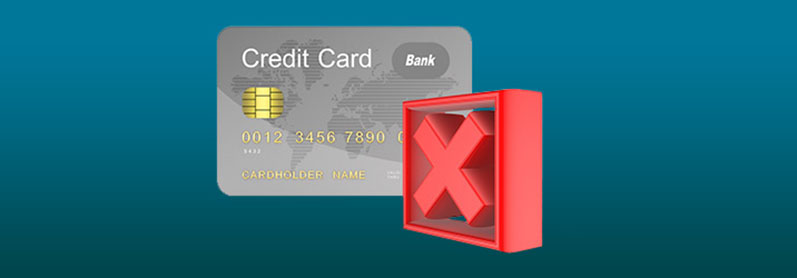6 Reasons the Bank Might Cancel Your Credit Card
Will Your Credit Card Account be Closed?
Many consumers have become dependent on credit cards; we can’t usually function without them. However, it is important to remember credit card ownership is a privilege, not a right. And a bank can cancel your credit card account at any time.
Understanding the Magnitude of a Cancelled Account
There are some obvious consequences if the bank (or credit card issuer) decides to cancel your credit card account. The most public, and embarrassing, side effect is a declined transaction while shopping. Since the bank isn’t required to notify customers when they cancel the credit card, you might find yourself in a very awkward situation.
Also, a cancelled account could harm your credit score. More often than not, though, it is the activity that lead to the cancelation that damages your reputation. It is possible to improve your credit and recover from a cancelled account, but it will take time.
Because the outcomes of a cancelled account aren’t good, it is important to know what can trigger this activity.
1. You Stopped Using the Account
The bank isn’t allowed to add a dormant or inactive fee to your account. Therefore, there is no perks for them to keep your stagnant account open. Some issuers will offer to waive the annual fee (or part of it) if the account remains in use. However, few banks are willing to put in the administrative effort to monitor such activity.
To keep your account active, make at least one charge every three to four months.
2. You Fell Behind on Payments
Each credit card statement will come with a few bill payment options. You can either pay the full balance or just cover the minimum requirement.
If you fail to make even the minimum payment, the bank will probably suspend your ability to make new purchases. This punishment usually goes into effect when the account is 60 to 90 days past due. Once you are current on the payments, you’ll be able to use the card again.
However, if you don’t pay the bill for 180 days, or six months, the bank will almost certainly close your account. Even after the account is closed, you will still be expected to make payments on the remaining balance.
Unfortunately, there isn’t much grace administered to cardholders who are behind on payments. Even if the accumulated debt isn’t of your own doing (for example, the result of internet fraud), the bank will still take the necessary actions to cancel your credit card account.
3. The Bank Closed
Banks will close their doors if they are unable to turn a profit. If this happens, there are a few different outcomes for your credit card account.
The closing bank may simply cancel your credit card account. The alternative is for the bank to sell your account to another issuer.
The different issuer may require old account holders to apply for a new account with different terms.
4. Your Credit Score Dropped
Cardholders often have a misunderstanding of how their overall credit score affects certain things.
For example, if you fall behind on your Visa payments issued from Bank X, Bank Y can’t raise the rates of your MasterCard. However, if your credit score drops because of the financial mismanagement of Bank X’s Visa, Bank Y may cancel your MasterCard.
College students should pay close attention to this information. Many young adults find themselves victims of college student scams. Fraudsters prey on these individuals’ naivety and issue credit cards with extreme interest rates. Trouble with one card could lead to cancelation of another.
5. You Rejected the Card’s Terms and Conditions
Banks will periodically change the terms associated with a credit card account. The most notable change is an interest rate increase or a hike in annual fees.
The bank is required to give you a 45 day notice of such a change. If you decline the increase, you have the right to pay off the remaining balance in that time period at the previously agreed upon rate.
However, if you reject the new terms and conditions, the bank will likely cancel your credit card account.
6. You Filed Too Many Chargebacks
Chargebacks are a form of consumer protection. If someone makes fraudulent, unauthorized transactions on your card, you aren’t responsible for paying them.
However, many cardholders have started using chargebacks as a form of online shoplifting. They engage in “friendly fraud” by contacting the bank for a refund instead of the merchant.
Because of this new trend, many banks are on the lookout for potential friendly fraudsters. If you file too many chargebacks—legitimate or fraudulent—the bank may simply cancel your account.
To be on the safe side, be a smart shopper.
- Ask the merchant for a return instead of filing a chargeback. While this is the more ethical route, it can be frustrating for the consumer. Rather than deal with the merchant yourself, let eConsumer Services® help. Fill out the form to the right and we’ll get the refund for you.
- Avoid counterfeit websites. The short-term benefits of a discount aren’t worth the long-term effects of online fraud.
Because credit cards have become an essential part of our modern lives, we often forget they are a privilege, not a right. Keep your account in good standing and the bank won’t be forced to cancel your credit card.



